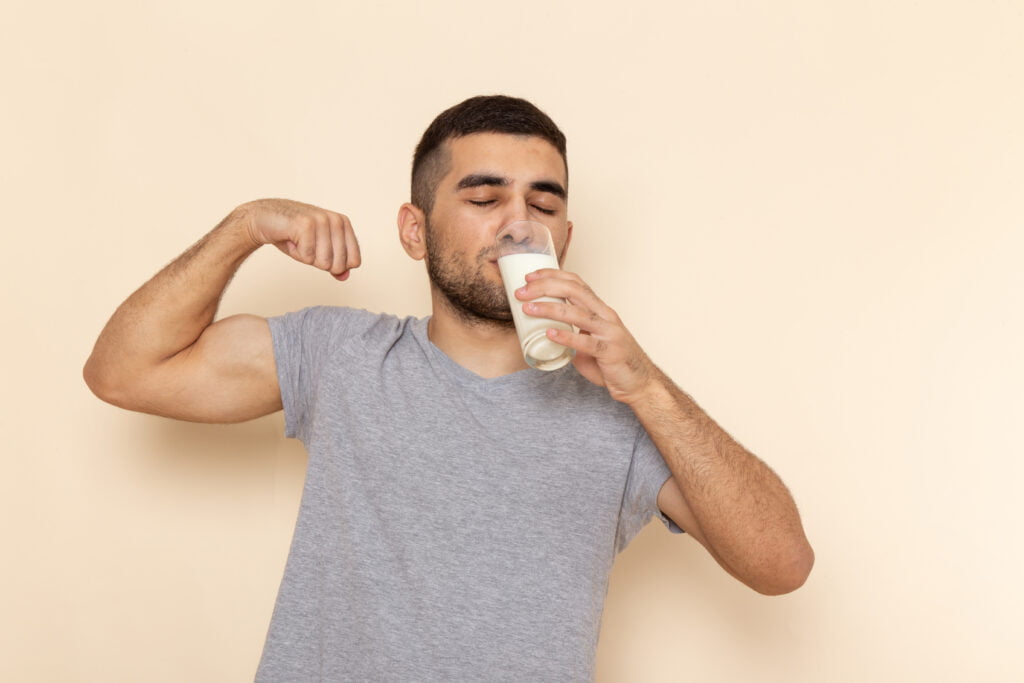Creatine, a popular dietary supplement favored by athletes and fitness enthusiasts alike, is known for its role in enhancing performance, increasing strength, and supporting muscle growth. But does it also make you thirsty?
This question stems from observations and reports from users who experience an increase in thirst after starting creatine supplementation. Creatine works by increasing the phosphocreatine stores in your muscles, which is used for energy during high-intensity, short-duration exercises.
This process, while beneficial for boosting athletic performance, has a side effect related to water retention. Creatine draws water into your muscle cells, impacting your body’s overall hydration levels. This mechanism can lead to a perceived increase in thirst as your body signals the need to replenish the water allocated to muscle cells.
Understanding this connection is crucial for those incorporating creatine into their fitness regimen, as it underscores the importance of maintaining adequate hydration to support health and performance enhancements effectively.
This question stems from observations and reports from users who experience an increase in thirst after starting creatine supplementation. Creatine works by increasing the phosphocreatine stores in your muscles, which is used for energy during high-intensity, short-duration exercises.
This process, while beneficial for boosting athletic performance, has a side effect related to water retention. Creatine draws water into your muscle cells, impacting your body’s overall hydration levels. This mechanism can lead to a perceived increase in thirst as your body signals the need to replenish the water allocated to muscle cells.
Understanding this connection is crucial for those incorporating creatine into their fitness regimen, as it underscores the importance of maintaining adequate hydration to support health and performance enhancements effectively.
Relationship Between Creatine and Thirst
The relationship between creatine supplementation and thirst is closely linked to the way creatine affects water distribution in the body. Creatine is stored in the muscles, where it attracts water, leading to an increase in intracellular fluid volume. This process is beneficial for enhancing muscle energy reserves and can contribute to muscle growth and performance. Factors involved in this relation is given:
Creatine Supplementation and Muscle Hydration: Creatine attracts water, leading to increased intracellular fluid volume in muscles.
This process enhances muscle energy reserves, supporting growth and performance.
Impact on Body’s Water Balance: The shift of water into muscles can affect overall hydration, potentially causing dehydration. The body perceives this change as increased thirst, signaling the need for more fluid intake.
Osmotic Balance and Thirst Mechanism: Creatine increases the osmolality within muscle cells, drawing water from other body areas. The body responds by triggering thirst to restore fluid balance across cells.
Importance of Increased Water Intake: Responding to thirst by drinking more water helps maintain hydration during creatine supplementation. Adequate hydration supports kidney function and ensures optimal benefits from creatine without dehydration risks.
Overall Health and Well-being: Maintaining hydration is crucial for health, especially during intense training or in hot climates. Drinking enough water is essential for maximizing the effects of creatine and sustaining general health.
Impact on Body’s Water Balance: The shift of water into muscles can affect overall hydration, potentially causing dehydration. The body perceives this change as increased thirst, signaling the need for more fluid intake.
Osmotic Balance and Thirst Mechanism: Creatine increases the osmolality within muscle cells, drawing water from other body areas. The body responds by triggering thirst to restore fluid balance across cells.
Importance of Increased Water Intake: Responding to thirst by drinking more water helps maintain hydration during creatine supplementation. Adequate hydration supports kidney function and ensures optimal benefits from creatine without dehydration risks.
Overall Health and Well-being: Maintaining hydration is crucial for health, especially during intense training or in hot climates. Drinking enough water is essential for maximizing the effects of creatine and sustaining general health.
Do I Need To Drink More Water With Creatine?
Yes, when supplementing with creatine, increasing your water intake is advisable. Creatine is known to cause muscles to draw more water from the body into themselves, enhancing muscle energy storage and potentially leading to increased muscle size. This process, however, can affect the body’s overall hydration status. As the muscles retain more water, it’s important to replenish the body’s water supply to maintain proper hydration levels, support metabolic processes, and ensure optimal performance and health.
Adequate hydration is crucial when taking creatine to prevent dehydration and the potential side effects that can accompany it, such as cramps, dizziness, and digestive issues.
Adequate hydration is crucial when taking creatine to prevent dehydration and the potential side effects that can accompany it, such as cramps, dizziness, and digestive issues.

While there’s no one-size-fits-all recommendation for how much extra water you should drink, a good rule of thumb is to listen to your body’s signals and consume water consistently throughout the day, especially before, during, and after workouts.Keep an eye on your hydration status by observing the color of your urine—aim for light yellow—and be mindful of any signs of dehydration. Adjusting your water intake based on your activity level, the climate you’re in, and your individual response to creatine supplementation will help ensure you stay well-hydrated and get the most benefit from your creatine use.
Factors That May Contribute to Increased Thirst While Taking Creatine
When taking creatine, several factors can contribute to an increased sensation of thirst. Understanding these factors can help individuals manage their hydration more effectively while benefiting from creatine supplementation. Here are the key contributors:
Increased Muscle Water Retention: Creatine causes muscles to retain more water, which can lead to a temporary imbalance in the body’s overall water distribution. This increased intracellular hydration prompts the body to signal for more water intake to rebalance its hydration status.
Increase Metabolic Activity: Creatine supplementation can enhance physical performance by increasing the availability of ATP (adenosine triphosphate), the energy currency of cells. This boost in energy metabolism may increase the body’s water requirements as metabolic reactions often involve water as a reactant or product.
Osmotic Pressure Changes: The osmotic balance between the intracellular and extracellular environments can be altered when creatine pulls water into muscle cells. This change in osmotic pressure can trigger the body to increase thirst as a mechanism to ensure that fluids are adequately replenished.
Temperature Regulation: With increased energy metabolism and muscle activity, the body may produce more heat. Water plays a critical role in thermoregulation, helping to dissipate excess heat through sweat. As a result, the body may demand more fluids to compensate for this increased heat dissipation.
Exercise Intensity and Duration: Individuals taking creatine often engage in high-intensity and longer-duration workouts. These activities naturally increase sweat loss and, consequently, the body’s need for water to prevent dehydration and maintain performance.
Dietary Factors: The diet of someone taking creatine might also influence hydration needs. High-protein diets, often associated with muscle-building regimens, require more water for metabolism and the excretion of nitrogenous wastes. Additionally, the consumption of caffeine and other diuretics can further increase fluid requirements.
Individual Variation: People’s hydration needs vary widely based on factors like body size, activity level, and environmental conditions. Those using creatine may have inherently higher baseline needs for water, which can be amplified by the supplement.
Increased Muscle Water Retention: Creatine causes muscles to retain more water, which can lead to a temporary imbalance in the body’s overall water distribution. This increased intracellular hydration prompts the body to signal for more water intake to rebalance its hydration status.
Increase Metabolic Activity: Creatine supplementation can enhance physical performance by increasing the availability of ATP (adenosine triphosphate), the energy currency of cells. This boost in energy metabolism may increase the body’s water requirements as metabolic reactions often involve water as a reactant or product.
Osmotic Pressure Changes: The osmotic balance between the intracellular and extracellular environments can be altered when creatine pulls water into muscle cells. This change in osmotic pressure can trigger the body to increase thirst as a mechanism to ensure that fluids are adequately replenished.
Temperature Regulation: With increased energy metabolism and muscle activity, the body may produce more heat. Water plays a critical role in thermoregulation, helping to dissipate excess heat through sweat. As a result, the body may demand more fluids to compensate for this increased heat dissipation.
Exercise Intensity and Duration: Individuals taking creatine often engage in high-intensity and longer-duration workouts. These activities naturally increase sweat loss and, consequently, the body’s need for water to prevent dehydration and maintain performance.
Dietary Factors: The diet of someone taking creatine might also influence hydration needs. High-protein diets, often associated with muscle-building regimens, require more water for metabolism and the excretion of nitrogenous wastes. Additionally, the consumption of caffeine and other diuretics can further increase fluid requirements.
Individual Variation: People’s hydration needs vary widely based on factors like body size, activity level, and environmental conditions. Those using creatine may have inherently higher baseline needs for water, which can be amplified by the supplement.
Conclusion: Is Creatine Good For Dehydration?
Creatine supplementation enhances athletic performance and muscle growth but also impacts hydration by increasing muscle water retention. This process necessitates increased water intake to maintain overall hydration and optimize the supplement’s benefits. The relationship between creatine and thirst is due to its effect on water distribution within the body, highlighting the importance of hydration for health and performance.
Factors contributing to increased thirst include osmotic changes, elevated metabolic activity, temperature regulation during exercise, dietary influences, and individual hydration needs. Proper hydration strategies are crucial for those using creatine. These include monitoring water intake, paying attention to urine color, hydrating before and after workouts, incorporating water-rich foods, limiting diuretics, using electrolyte supplements as needed, and adjusting for environmental conditions.
Understanding these aspects and adopting effective hydration management practices ensures that creatine supplementation’s advantages are fully realized, supporting muscle growth, performance enhancement, and overall well-being.
Factors contributing to increased thirst include osmotic changes, elevated metabolic activity, temperature regulation during exercise, dietary influences, and individual hydration needs. Proper hydration strategies are crucial for those using creatine. These include monitoring water intake, paying attention to urine color, hydrating before and after workouts, incorporating water-rich foods, limiting diuretics, using electrolyte supplements as needed, and adjusting for environmental conditions.
Understanding these aspects and adopting effective hydration management practices ensures that creatine supplementation’s advantages are fully realized, supporting muscle growth, performance enhancement, and overall well-being.





